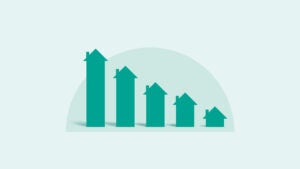What happens to a HELOC when you sell your house?




Key takeaways
- When a home is sold, a HELOC must be paid off, along with any other debts secured by the property.
- Outstanding HELOC balances are typically settled during the closing, out of the sale proceeds.
- If the home sale proceeds are not enough to cover the HELOC and mortgage, the seller may need to come up with cash or explore alternatives like a short sale.
Are you selling your home and have a HELOC? Get ready to say goodbye to them both. As an active debt tied to the property, the home equity line of credit must be paid off when that property changes hands.
While this may sound tricky, it’s actually quite doable with the proper preparation. Here are the steps to take when selling a house with a HELOC to ensure a smooth transaction.
Can you sell your house if you have a HELOC?
There’s nothing stopping you from selling your house when you have a home equity line of credit (HELOC). Having an outstanding HELOC balance doesn’t prevent you in any way from listing the property for sale and accepting a purchase offer for it.
However, a home cannot change title or ownership with a lien still on it – which a HELOC is. That means, either before or at the closing, the HELOC debt must be settled. Often you can arrange for the balance owed on your HELOC to be immediately repaid from the sale proceeds, just as your mortgage is.
Why do home sellers have to pay off their HELOC?
A HELOC is essentially a loan, backed by the equity you have in your home. And any outstanding obligations secured by your home have to be settled when you sell your home. That includes your primary mortgage, along with the HELOC.
During closing, the title company or closing attorney will order a payoff statement from your HELOC lender. The document will detail the amount needed to settle the HELOC: your outstanding balance, including any accrued interest and fees. But you don’t have to write a check — generally, the sum just gets deducted from the money the homebuyer is paying you.
“It’s almost identical to a first-lien mortgage; it gets paid off, and then whatever proceeds are left after the payoff would be due to the seller,” says Tom Hutchens, president of Angel Oak Mortgage Solutions, an Atlanta-based correspondent lender.
Imagine you sell your home for $400,000, with a $100,000 primary mortgage and a $50,000 HELOC remaining on your property. The $100,000 mortgage would have to be paid first due to its first-lien position, leaving you with $300,000. Then, you would settle your $50,000 HELOC, leaving you with $250,000. Any closing costs are deducted from this amount, leaving you with the final proceeds.
After the sale closes, the line of credit is shut down. Your lender will confirm that the HELOC has been paid off and release any liens on the property.
Complications in closing a HELOC when you sell a home
While settling a HELOC may sound straightforward, two factors may complicate the process: the amount of equity you have in your home and whether the loan has any prepayment penalties.
You are underwater
When you sell your house, the proceeds go towards paying off your primary mortgage first. The money left after that then goes towards paying off your HELOC and any other debts secured by the property.
But what if you owe more on the home than it’s currently worth, a condition known as negative equity or being underwater/upside down? “If somebody were underwater when they sold the house, instead of getting proceeds, they would be bringing cash themselves to make up the difference,” says Hutchens.
And what if you don’t have cash to make up the difference? In that case, you’ve got a problem. You might try to do a short sale, in which you’re allowed to sell the home for less than your outstanding mortgage, though probably both the mortgage lender and the HELOC lender would have to agree.
Other options that might make more sense:
- Wait to sell until housing prices go up in your area, giving you time to build or rebuild your home equity stake
- Wait until you’ve saved up enough money to cover the outstanding HELOC balance
- Step up repayments on the HELOC to get that balance down
- Take out a personal loan to cover the HELOC balance
The lender has prepayment penalties
A HELOC prepayment penalty is a fee the HELOC lender charges if you settle the debt ahead of schedule. These penalties reimburse the lender for the interest they would have earned if you had gone the full repayment period. Also referred to as an ‘early termination fee,’ the penalty can be 2 percent to 5 percent of the loan or a flat fee.
Though not as common as years ago, prepayment penalties do still exist, especially among traditional banks. If you are unsure if your loan has one, contact your HELOC lender. Like any aspect of a loan, you can negotiate the terms, though there’s no guarantee the lender will agree.
Bottom line on HELOCs when selling your home
When you decide to sell your home, your HELOC’s life ends — but it doesn’t just disappear. You must repay the funds you withdrew from it, along with any accrued interest.
Knowing your payoff balance and where you stand ahead of time can help you avoid surprises at closing. The key is to ensure you won’t be caught short and can comfortably handle all the expenses of selling your home.
Home sellers “need to understand what their balances are on their first lien mortgage as well as their home equity line of credit,” Hutchens says. “They need to make sure whatever they’re looking to sell that property for, that they’re still going to be in a positive situation at the closing table. Or if not, understand how upside down they are before going forward with the sale of the property.”
FAQ
Additional reporting by Mia Taylor
Why we ask for feedback Your feedback helps us improve our content and services. It takes less than a minute to complete.
Your responses are anonymous and will only be used for improving our website.




